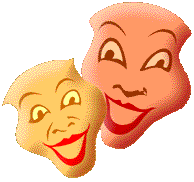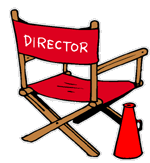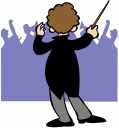Theatre Companies & Play Production
A Guide to Structure


Creative Staff
Director
The Director is solely responsible for the artistic unity of the production, based on his/her overall concept or vision. His/hers is the final responsibility for every aspect of the show, including, but not limited to, the overall look, the specific characterizations and staging, the music, dance, set, props, costumes, lighting and sound. All design plans are created under his/her supervision, all actors are under his/her direction. The director's work includes:
playwright (and possibly composer and lyricist) to shape the play,
mood, pace and arc of the action,
choreographer, when appropriate, and the help of the stage manager,
designers and performers,
characterizations with the actors.
The Director cannot be responsible for the administrative, financial and day to day workings of the production and still be expected to do his/her job well. Creating a world out of words, bodies and thin air is a totally time consuming occupation and any extraneous responsibilities only diminish his/her effectiveness where s/he is needed most. It is the job of the Producers and Stage Manager to make sure these details are seen to, efficiently and without bother to the director or performers, in order to assure the best possible show. The director is sometimes assisted by an Assistant Director.
Assistant Director
This is a position that really has no clear job description or job responsibilities. It tends to be whatever the specific Theatre or Director decide it will be. The Assistant Director works with the director, who designates the AD's duties. Every director works differently. However, in general, the Assistant Directors responsibilities may include the following:
character and relationship problems, actor-related blocking and acting problems,
line notes, and so on,
director works with the principals.
The Assistant Director sometimes takes on some of the responsibilities of Stage Manager or ASM such as being on "on book" during rehearsals, taking blocking, or acting as liaison for the director. Occasionally, especially in community theatres or small theatre companies, the jobs of Assistant Director and Stage Manager may be combined and both positions held by one person.
Musical Director
The Musical Director is responsible for every note of music in a musical theatre production. His/her responsibilities include:
and dynamics to the singers,
performances.
Choreographer
The Choreographer is the heart and soul of the dance in any musical. S/he creates the style and form of the dance routines and teaches them to the cast. His/her responsibilities include:
Fight Choreographer (Stage Combat Director)
The Fight Choreographer is the designer and director of the physical conflict of any play. S/he is a person trained to create and teach the art of Stage Combat, including everything from simple slaps, hand-to-hand combat, swordplay, the use of other weapons, etc., so that all physical conflict in a play can look real and yet be performed safely. S/he creates the style and form of the fight routines and teaches them to the cast. His/her responsibilities include:
aggressive physical contact,

